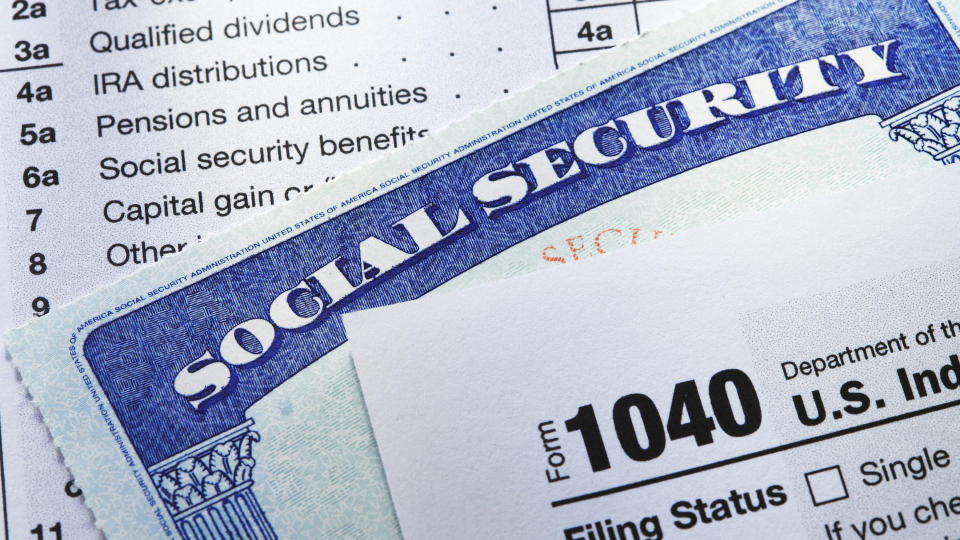6 Things Social Security Deducts From Your Benefits

Although the amount of your Social Security benefit is readily available on the ssa.gov website or from other sources, that number is not necessarily the amount that will actually be deposited in your bank account.
Retirement Savings: Experts Say This Magic Number Is the Key — and It’s Not $1 Million
See: 3 Ways To Recession-Proof Your Retirement
In many situations, the Social Security Administration processes deductions to your benefit amount that may reduce your actual payment. In others, actions you take on your own might lower the amount you receive.
Here’s a look at some of the more common ways that your Social Security payment may be reduced.
Taxes
For many Americans, Social Security is nontaxable. However, if you earn above certain limits, a portion of your Social Security may become taxable income. For tax year 2022, here is the breakdown for individuals:
Combined income up to $25,000: no tax
Combined income between $25,000 and $34,000: up to 50% of benefits may be taxable
Combined income above $34,000: up to 85% of benefits may be taxable
For joint filers, the limits are higher:
Combined income up to $32,000: no tax
Combined income between $32,000 and $44,000: up to 50% of benefits may be taxable
Combined income above $44,000: up to 85% of benefits may be taxable
If you are married and filing separately, your Social Security income probably will be taxable, per the Social Security Administration.
For Social Security purposes, “combined income” refers to your adjustable gross income plus nontaxable interest plus half of your Social Security income.
Retirement Savings: Here’s How Much Cash Baby Boomers Need To Retire in the Next 5 Years
Government-Imposed Levies
For the most part, your federal benefits are untouchable by creditors. For example, even if you default on a credit card, the issuer can’t garnish your Social Security benefits. However, any debt that is owed to or imposed on you by the government gets priority. If you owe back taxes, for example, the government will step in and garnish up to 15% of your Social Security benefits, even if other creditors cannot.
Similarly, if you default on a government-issued student loan, you can expect to lose up to 15% of your Social Security benefit to the government. Court-ordered payments — such as child support, alimony or restitution to crime victims — also can be taken out of your Social Security benefit.
Medicare Premiums
When you sign up for Social Security, you’re automatically enrolled in Medicare Part A, which provides hospital coverage. There is no charge for Medicare Part A.
However, if you choose to enroll in Medicare Part B — which covers certain medical services and equipment, home healthcare and some preventative services — you’ll need to pay a monthly premium. This will be deducted directly from your Social Security check, reducing the amount you get.
Limitations
If you’re receiving both workers compensation and SSDI payments, the SSA may apply an offset that would effectively reduce your disability payments. According to the rules, the combination of your workers compensation and SSDI payments can’t total more than 80% of your average earnings at the time you became disabled. This can reduce your total net payout.
Your Social Security earnings also might be reduced if you exceed the family limit. For example, if you qualify for your own benefit but your spouse and children can also claim benefits, your payout might be reduced so that they may receive their own. The maximum benefit varies from family to family based on somewhat complex SSA calculations. However, it is typically between 150% and 188% of the primary worker’s basic Social Security benefit.
Reductions Due To Working
The rules can get a bit complicated, but if you’re younger than full retirement age and you continue to work, your Social Security benefit may be temporarily reduced. Specifically, the SSA will dock your payout by $1 for every $2 you earn above the annual limit, which is $21,240 in 2023.
However, the year you reach full retirement age, the reduction drops to $1 for every $3 you earn above $56,520 (for 2023). After you cross the threshold of full retirement age, there are no more reductions.
The good news is that if your Social Security is reduced due to your work record, the SSA will adjust your later payments to make up for any money that was taken out. In other words, you don’t “lose” these benefits; they are merely deferred.
Overpayments
In some cases, the Social Security Administration may overpay you. Even if you didn’t technically do anything “wrong,” the SSA will want that money back.
For example, if your spouse dies and you receive one or more payments before Social Security is aware of the death, that money must go back. If for some reason you are mistakenly paid your benefit twice in the same month, errors like that must be corrected.
More From GOBankingRates
Major Cuts to Social Security Are Back on the Table -- What's Being Proposed Now?
Financial Insight in Your Inbox: Sign Up for GBR's Daily Newsletter
What's the Best Small Business in Your State? Vote For Your Favorite
This article originally appeared on GOBankingRates.com: 6 Things Social Security Deducts From Your Benefits
